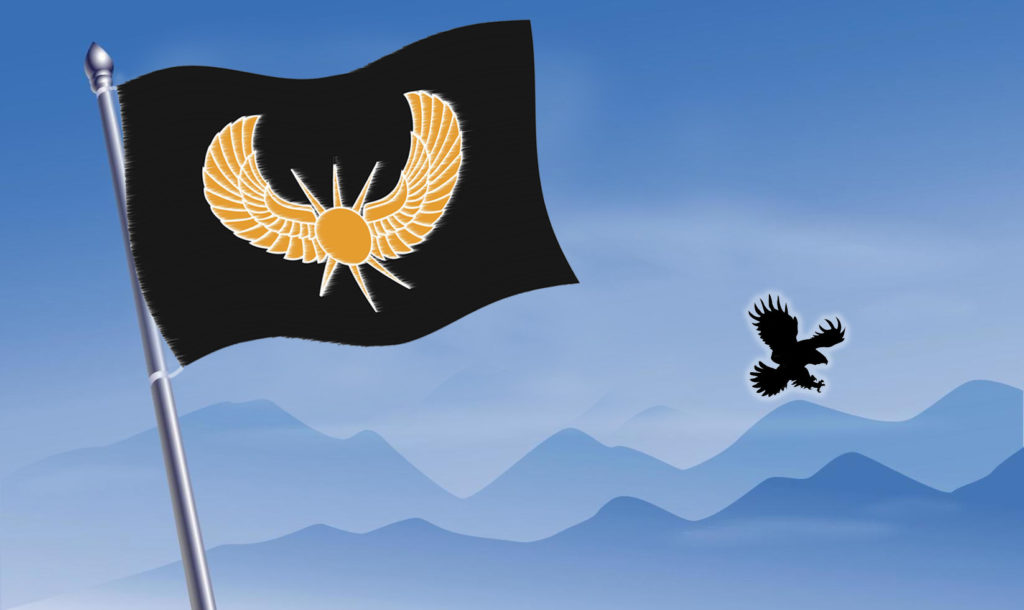
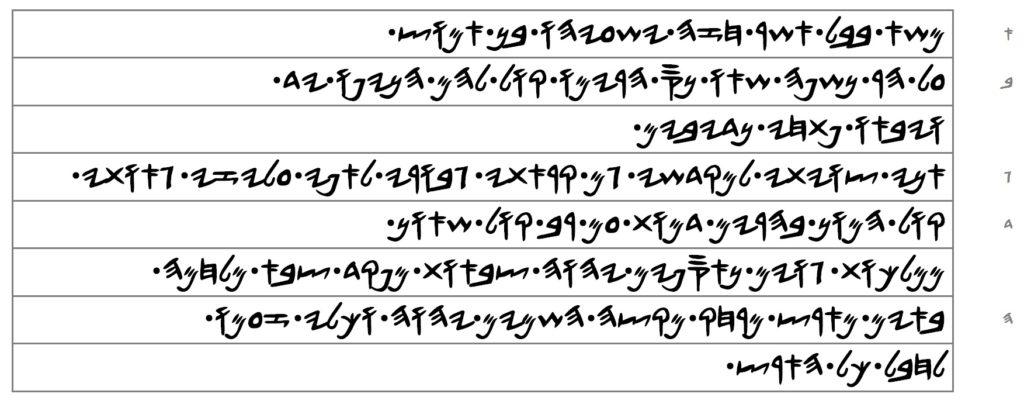
[1] mash’ Babal ashar khazah Yashai-Ya’oh Ban Amots
The burden of Babal which did see Yashai-Ya’oh Ban Amots:
[2] ghal har nashapah sha’o nas haraymo kol la-ham hanaypo yad wa-yaba’o pathakhay nadaybaym
upon the mountain windswept lift you all an ensign flag; exalt you all the voice at them; wave you all the hand and they will come, the entrances of the nobles
[3] anay tso’aythay la-makadashay gam kar’athay gaboray la-apay ghalayzay ga’othay
I have commanded to my ones who set apart, even I have called my warriors for my anger, the ones rejoicing in my majesty
[4] kol hamon ba-haraym damoth gham rab kol sha’on ma-malchoth go’aym na’asapaym YA’OH tsaba’oth mapkad tsab’ malkhamah
the a voice of a multitude in the mountains, the likeness of a great nation; a voice of the tumult of kingdoms of peoples gathered together; YA’OH of Hosts is the one mobilizing the host of war
[5] ba’aym ma-arats markhak ma-katsah ha-shamaym YA’OH wa-chalay zaimo la-khabal chal ha-arats
the ones coming from a land very far away, from the end of heaven; YA’OH, and the weapons of His rage, to destroy the whole earth
COMMENTARY OF YASHAI-YA’OH 13:1-5
[Verse 1] The title mash’ (burden, hard utterance) which is repeated in Yashai-Ya’oh 15:1; 17:1; 19:1; 21:1; 22:1; and 23:1, indicates that we have in these divisions a collection of prophetic utterances bearing upon the future of the nations of the world, among which prophetic Babal (Babylon) is the pre-eminent nation and the main focus.
[Verse 2] ghal har nashapah sha’o nas (upon the mountain windswept lift you all an ensign flag). This command in the 2nd person masculine plural is being given by the prophet to his future readers who are his own people. He is not talking to a single individual. He is talking to everyone who will be part of the remnant and telling them what they must do collectively.
Mountains at high elevations are more surrounded by free air which makes them windy and breezy. A nas (ensign flag) planted high up on a nashapah (windswept) mountain will be blowing in the wind, and this is a spectacle that will attract attention from onlookers. The order that is being given is symbolic. The prophet is not telling his readers to go literally put a nas on top of a windy mountain. The nas represents the remnant of Ya’oh-shar-al who will plant themselves on a high mountain in the second wilderness after making their Exodus from the land of pyramids in the west. It is their city, the bustling activities of their community, and like a literal nas on a mountain, blowing in the wind high above the tree line, it will attract attention and be noticed from far away. A city on a hill cannot be hid.
haraymo kol la-ham (exalt you all the voice at them). A second directive is now given to the remnant in the second wilderness. They must lift up their voices as one voice and aim it la-ham (at them), i.e. at the people of Babal, their enemy.
hanaypo yad wa-yaba’o pathakhay nadaybaym (wave you all the hand and they will come, the entrances of the noble ones). A third directive is now given. This time the remnant of Ya’oh-shar-al in their mountain city is ordered to collectively wave their hands as if one beckoning hand so that the pathakhay nadaybaym (entrances of the noble ones) will come.
The pathakhay nadaybaym are the subject of the imperfect 3rd person masculine plural verb yaba’o (they will come). These are not literal doors or gateways. They represent the wealth, power, and the privileges of status enjoyed by the magnates of Babal as they come and go in their life of ease in Babal. Their pathakhaym (entrances) will be taken away and they will come instead to the remnant whose status will no longer be abayonaym (needy ones).
[Verse 3] anay tso’aythay la-makadasha-ay (I have commanded to my ones who set apart). The late Jewish Masoretic pointing takes the participle makadash to be passive מְקֻדָּשָׁי and written defectively. There is no reason a-priori to agree with this. As written, the plural participle is active not passive. YA’OH has commanded His ones who set apart. This is another reference to the remnant of Ya’oh-shar-al who pro-actively set apart by gathering themselves to the second wilderness in order to live set apart from the heathens and keep the covenant of YA’OH.
gam kar’athay gabora-ay la-apay ghalayzay ga’othay (even I have called my warriors for my anger, the ones rejoicing in my majesty). The only ones rejoicing in the majesty of YA’OH are His chosen people and they are the ones who will be His warriors executing His fierce anger. This is the remnant in the second wilderness once again. YA’OH will wage war against the United States of America (modern-day Babal, Matsraym, Ashor, and Rome) with raised voices and battles of swinging, i.e., not with arrows, bullets, or any other kind of man made weapon, but by His prophet waving the matah mosadah in his hand while the remnants of Ya’oh-shar-al who are with him in the second wilderness raise their voices and play on drums and stringed instruments (Yashai-Ya’oh 30:32). The enemies will be threshed and smitten by catastrophic natural disasters repeatedly without being able to defend themselves.
[Verse 4] kol hamon ba-haraym damoth gham rab (the voice of a multitude in the mountains, the likeness of a great nation). When the remnant of Ya’oh-shar-al is gathered to the mountains in the second wilderness their numbers will initially be relatively small in comparison to the majority of their people who remained in the land of the pyramids. Nevertheless, the volume of noise they will make as they praise the name YA’OH in the mountains will be as the damoth (likeness) of a great nation in the mountains.
The prophet Yaram-Ya’oh (Jeremiah) also connects the army of the remnant that will utterly destroy Babal with mountains when he speaks metaphorically of them being Maday, Ararat, Manay, and Aschchanaz:
“Li
Lift up a banner in the earth you all! Make loud the shopar among the peoples you all! Make holy the peoples against her you all! Cause to proclaim against her the kingdoms of Ararat, Man-ay, and Ashchanaz! Appoint against her the commanding general scribe you all! And cause to go up the horse like the yalak locust of nappy hair you all!
Make holy the peoples against her you all: the king of the Mad-ay, the governors of it, and all the rulers of it, and all the land of his domain (Yaram-Ya’oh 51:27-28).
The heathen bible scholars will tell you Yaram-Ya’oh was speaking of the mountainous people who served within the Persian army of Cyrus the Great (550/547-517 BCE). That is a lie. It is a lie because the Persians did not destroy Babylon and turn it into a perpetual desolation. They captured it peacefully in 539 BCE and made themselves the new kings of Babylon. The city continued to exist during the entire period of the Persian Empire. Hence, when Yaram-Ya’oh mentions Maday, Ararat, Manay, and Aschchanaz in the above prophecy, he does not mean the ancient people of those literal geographical mountains.
The prophet Yaram-Ya’oh was doing what Yashai-Ya’oh often does and that is employing code to encrypt his message. Maday is a noun with a pronominal suffix meaning “my measure.” Ararat is derived from two verbs, arar (to curse) and ratah (to reverse), meaning “to curse is reversed.” Manay is another noun with a pronominal suffix meaning “my weighed portion.” Ashchanaz combines three elements: ash (fire); cha (like); naz (to shoot), meaning “fire, like a shot.”
All four names are describing, not heathens from mountain districts, but rather a holy people set apart unto YA’OH in the mountains, i.e. the remnant of Ya’oh-shar-al in the mountains of the second wilderness. They are the Maday, metaphorically speaking, because they have been measured and sized by YA’OH. They are Ararat metaphorically because their curses have been reversed and their curses have been put upon their enemies. They are the Manay, metaphorically speaking, because they are the remnant that has been weighed out and extracted from the masses of their people. They are the Ashchanaz, metaphorically speaking, because YA’OH will make them His weapon to shoot fire at His enemies from a distance.
kol sha’on ma-malchoth go’aym na’asapaym YA’OH tsaba’oth mapkad tsab’ malkhamah (a voice of the tumult of kingdoms of peoples gathered together; YA’OH of Hosts is the one mobilizing the host of war). I can already tell you now, even when ours numbers in this second wilderness are only 100 souls thus far, with many more still on their way, that the level of the volume of our combined voices, whenever we are gathered and praising the name YA’OH, shakes the ground like kingdoms all gathered in one place. I have even had to tell my people to lower their voices a bit when they are joyfully greeting a new arrival at the Mactan International Airport in Cebu because their sound is so bombastic it is as the sound of war, the sound of military hosts mobilizing for war. The sound we will make in the mountains, away from the heathen public, will be the sound of the tumult of gathered kingdoms indeed.
The Babal that Yashai-Ya’oh and Yaram-Ya’oh prophesied about being utterly destroyed and turned into perpetual desolation is none other than the United States of America. It is the prophetic modern-day Babal. The real destroyers of Babal will not be heathens with conventional weapons of warfare out to claim new territory. The empire of the United States of America cannot be taken down that way. That ship sailed after WWII and the end of the Cold War. Her fire power now is simply mind boggling. No country stands a chance against her in the air or on the ground. The only weapons she cannot defend herself against will be the weapons in the armory of YA’OH, weapons that He will put at the disposal of His remnant in the second wilderness, and these weapons are catastrophic weather, plague, and natural disasters.
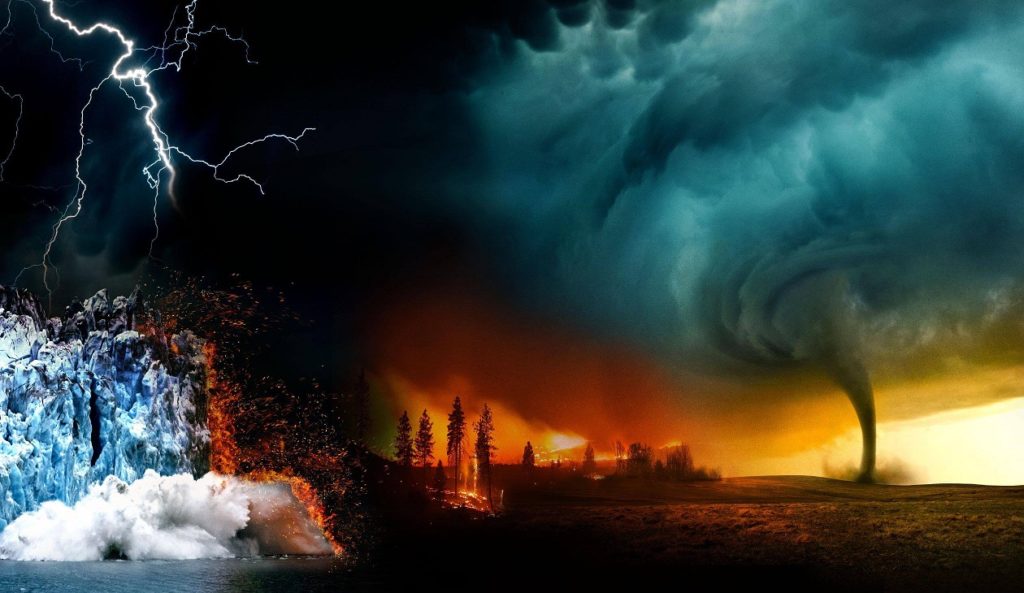
[Verse 5] ba’aym ma-arats markhak ma-katsah ha-shamaym YA’OH wa-chalay zaimo la-khabal chal ha-arats (the ones coming from a land very far away, from the end of heaven; YA’OH, and the weapons of His rage, to destroy the whole earth). The names Maday, Ararat, Manay, and Ashchanaz mentioned by Yaram-Ya’oh were never supposed to be understood as literal references to the indigenous people of geographical Iran, Armenia or Afghanistan. They are instead literal but coded references to the set apart remnant of Ya’oh-shar-al who will exit and come out of their captivity in the north country (making them the northern army that attacks Babylon). They are the weapons of the rage of YA’OH that will “come against” Babal and also destroy the whole earth from a far off distance at the end of heaven in the field of the second wilderness:
“for now will you go forth from the fortified city and you will dwell in the field, and you will come against Babal. There will you be delivered. There will YA’OH redeem you from the hand of your enemies” (Maychah 4:10).
The prophets all speak with unified voice. The remnant of Ya’oh-shar-al must first relocate to the second wilderness before it can bo ghad Babal (come against Babal). It will not use conventional weaponry, but rather the same weapons their Rock put into the hands of His servant Mashah in order to destroy Matsraym in the first exodus. He will turn His remnant into His battle axe (Yaram-Ya’oh 51:20-26) and He will respond to their voice (Khazon 11:6) when they call down the deadliest of natural calamities. The whole earth is to be destroyed in this manner, and Babal is the prime target.

[6] haylaylo chay karob yom YA’OH cha-shad ma-shaday yabo’
Cause yourselves to make a boisterous yell, for near is the day of YA’OH, as havoc destruction from the Almighty will it come.
[7] ghal chan chal yadaym tharapaynah wa-chal labab anosh yamas
therefore, all hands will become weak, and every heart of man will melt
[8] wA-nabahlo tsayraym wa-khabalaym ya’akhazon cha-yoladah yakhaylon aysh al rai-ho yathamah’o panay lahbaym panay-ham
and they will be in trepidation; pangs and sorrows will seize hold, like a pregnant woman in labor; they shall whirl about in anguish, each man to his close associate; they will be in shock, faces of flames are their faces
[9] hanah yom YA’OH ba’ achazaray wa-ghabarah wa-kharon ap la-shom ha-arats la-shamah wa-khat’a’ay-ha yashmayd ma-ma-nah
behold, the day of YA’OH is coming; cruel and excessive, and fierce of anger to lay the earth for desolation; and the sinners of it will He destroy from out of it.
COMMENTARY OF YASHAI-YA’OH 13:6-9
[Verse 6] Yet another directive is given to the remnant of Ya’oh-shar-al gathered to the second wilderness. They are to cause themselves to make a boisterous yell. This is not the noise of fear. It is the noise of a battle cry. They are to shout as soldiers who are about to engage in battle to express their solidarity and to intimidate their enemy. YA’OH is going to use His people to wreak havoc destruction on the whole world.
[Verse 7] chal yadaym tharapaynah wa-chal labab anosh yamas (all hands will become weak, and every heart of man will melt). This is not some local emergency in one city. This is worldwide. The entire world will be weakened and everyone’s heart will be overcome with terror; everyone, that is, except those who have been gathered to the mount Tsayon in the second wilderness, those survivors who call upon the name YA’OH (Ya’oh-al 2:31-32).
[Verse 8] Hollywood has never made a movie about an apocalypse like this. Nothing you’ve ever seen in any movie compares to what is being related by the prophet in this verse. Forget about the movie 2012 where the governments of the world secretly prepare for the end to ensure their own survival, and the survival of the richest people. According to this verse, the day of YA’OH comes without any warning signs other than the words of the prophets. No one will be prepared for what is about to happen worldwide except for those who make His short list and are gathered to the second wilderness.
[Verse 9] The day of YA’OH is coming to destroy the whole earth. It will be cruel and excessive. Young and old, sick and healthy, infants and pregnant women, they will all die horrible deaths. There will be no discrimination. Destruction and death are coming to virtually everyone who is not gathered to the mount Tsayon in the second wilderness. He intends to root all sinners from out of the earth completely.
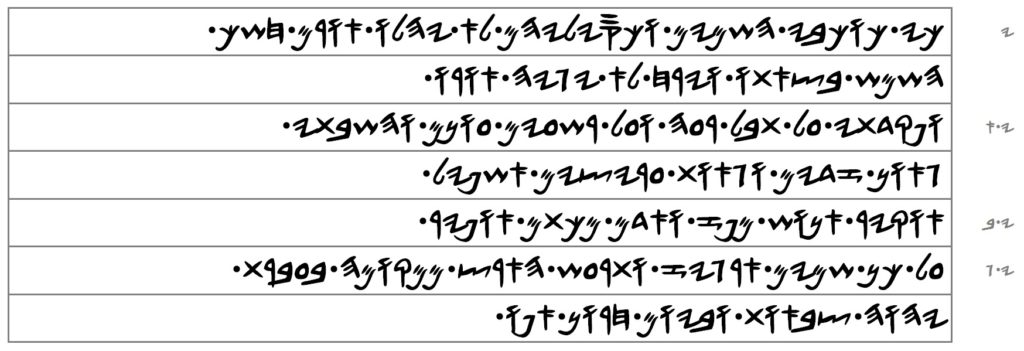
[10] chay chochabay ha-shamaym wa-chasaylay-ham la yahlo ‘or-am khashach ha-shamash ba-ts’atho wa-yarakh la yagayh ‘or-o
for the stars of the heaven and the point of their rotations not will they shine their light; it grew dark the sun in its going forth; and the moon, not will it cause to illuminate the light of it.
[11] wA-pakadthay ghal thabal rai-ha wa-ghal rashai’aym ghon-am wA-hashbathay ga’on zadaym wa-ga’oth gharaytsaym ashpayl
and I will visit upon the world the evil of it; the wicked ones the punishment of them; and I will cause to cease the arrogancy of the prideful ones, and the haughtiness of the terrible ones will I lay low.
[12] ‘okayr anosh ma-paz wa-adam ma-chatham Opayr
I will cause to be precious a man more than fine gold, and man more than a wedge of gold of Opayr
[13] ghal chan shamaym argayz wA-tharaish ha-arats ma-makokm-ha ba-ghabarath YA’OH tsaba’oth wa-ba-yom kharon ap-o
therefore the heavens will I shake, and the earth will remove from its place in the wrath of YA’OH of Hosts, and in the day of the fierceness of his anger
COMMENTARY OF YASHAI-YA’OH 13:10-13
[Verse 10] The heathens in ancient times believed in constellations and they still do. Our Ghabaray ancestors did not. They did not group chochabay ha-shamaym (the stars of heaven) into imaginary shapes of animals, or people, or objects. The word chasayl (center point of star rotation) refers to the rotation of all the stars around the same point directly above the north pole that heathens call the north celestial pole. It is as if all the stars are all bound by invisible cords to the pole of a merry-go-round (Ay’ob 38:31). There are stars that are fixed in their movement around the chasayl and never change their positions, and there are stars (planets) that change their positions as they move around the chasayl.
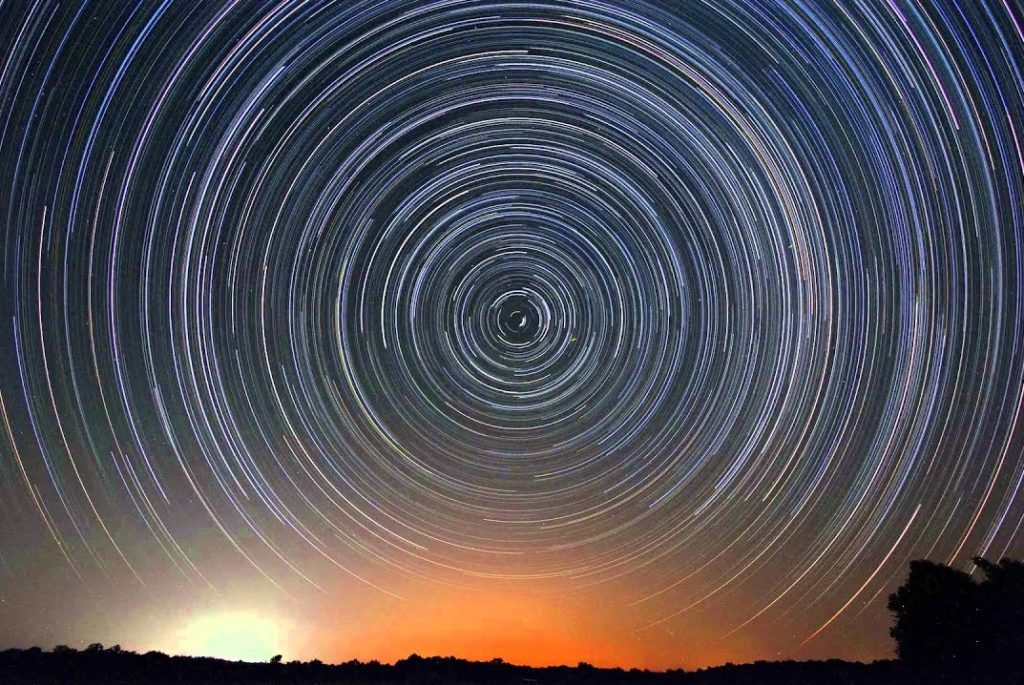
There is no such thing as a south pole, nor is there a south celestial pole. The stars only appear to rotate around the chasayl in the opposite direction to an observer at latitudes south of the equator simply because the heaven above us is so vast and we are not able to see all of it at once with our eyes.
The prophet is stating in this verse, and in no uncertain terms, that the day is coming when all the stars will stop shining as they move around the chasayl. He is also saying that the sun will grow dark in its going forth, and that because the sun will grow dark the sun will not illuminate the light of the moon. It is a fact that the sun illuminates the moon. We cannot see the sunlight as it travels to the moon because light waves are invisible to our eyes unless they strike something with enough density to reflect light, and there is nothing between the sun and moon dense enough to do that.
It’s the same reason you cannot see the air you breathe. Air is not dense enough to absorb or reflect light. It transmits whole light since it is an almost perfect transparent substance. We perceive black skies at nighttime when in fact there is sunlight up there. We just cannot see it. We perceive blue skies in the daytime because the part of the light spectrum that is visible to our eyes when sunlight strikes the dense gasses that make up the atmosphere is blue. Hence the prophet is not speaking figuratively or metaphorically. He is speaking literally when he says all the lights in the heavens will be turned off. As I said earlier, no Hollywood movie has ever truly re-enacted the horrific day of YA’OH that the prophets describe.
[Verse 11] The thabal (world) is going to be destroyed, not just one country, but every country except where the second wilderness is located in the east.
[Verse 12] Pure gold is highly valuable and also hard to find. According to geologists, gold only makes up 0.0000004% of the earth’s crust, which makes it relatively scarce, especially among other valued metals such as silver. The prophet is relating in this verse that the human population of the world is going to be drastically reduced by YA’OH in the outburst of His rage, and that finding a man will be as difficult as finding pure gold. You need to let that sink in, because there will be Captain Rogers, no Tony Stark, and no Thor saving the world from this. This is real.
Opayr (aka Ophir) is mentioned because Opayr is the location of the second wilderness where pure gold exists. It is the archipelago located in the east where He has caused His name to be re-introduced via a ravenous bird. The most valuable people in the eyes of YA’OH will be the ones who He has gathered to Opayr from out of the land of their captivity in the New World to shelter them from the worldwide destruction He will unleash.
The world is going to be reset by total devastation caused by YA’OH through the weapons of His rage, i.e. the remnant of Ya’oh-shar-al in the second wilderness, and it is going to take time for the few heathens who do survive the destruction to repopulate the places where they live on earth. The reduction in the human population will not be the result of some imaginary WWIII, a nuclear holocaust fought between nuclear nations; nor by any sterilization and population control conspiracy. It will be YA’OH and His remnant against everyone, and it will be extremely violent and excessively cruel.
[Verse 13] The heavens will be shaken, literally (Yashai-Ya’oh 34:4). The earth’s landmasses will move and reel to and fro like a drunkard, literally (Yashai-Ya’oh 24:20). Mountains will crumble, islands will disappear; and all of this catastrophic shaking will pave the way for the remnant of Ya’oh-shar-al to recover the khamadath chal ha-go’aym, i.e. the Ark of the Covenant (Khag-Ya’oh [Haggai] 2:6-9), and bring it into the tabernacle of YA’OH they will build in the second wilderness, thus filling it with glory. The word khamadah (a thing desired) is a feminine noun. Hence the khamadath chal ha-go’aym (the thing desired by all of the people) is an object and not a man. The object that the people of Ya’oh-shar-al value more than anything is the Ark because of what is inside of it, the two tablets of stone carved out by Mashah but are inscribed by YA’OH Himself with His ten sayings (Thorah 2.34:1). I am therefore eagerly awaiting for the day of YA’OH and the fierceness of His anger to arrive and to get on with it.
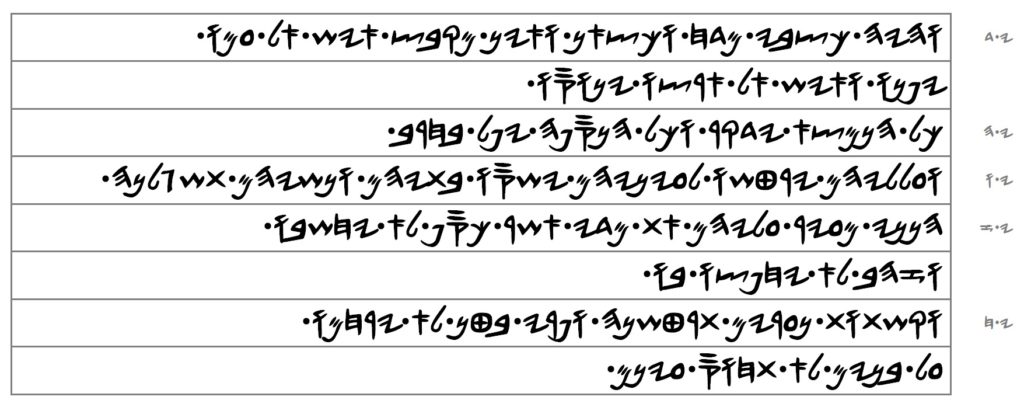
[14] wA-hayh cha-tsabay madakh wa-cha-tsa’an wa-ayn makabats aysh al ghamo yapano wa-aysh al aratso yanoso
and it will be like a gazelle, the one chased; and like sheep, and there isn’t one who collects; each man to his nation will he turn, and each man to his land will he flee.
[15] chal ha-namats yadakar wa-chal ha-nasapah yapal ba-kharab
everyone that is found, he will be thrust through; and everyone that is caught up, he will fall by the sword
[16] wa-ghalalay-ham yaratasho la-ghaynay-ham yashaso bathay-ham wa-nashay-ham thashagalnah
and their little ones will be dashed to pieces before their eyes; plundered will be their homes, and their wives will be raped
[17] hananay mai’ayr ghalay-ham ath Maday ashar chasap la yakhashabo wa-zahb la yakhapatso bo
behold I, the one raising up against them the Maday which silver not will they regard, and gold not will they delight in it
[18] wa-kashathoth nairaym tharatashnah wa-paray batan la yarakhamo ghal banaym la thakhos ghayn-am
and the bows of the young men will dash to pieces; even the fruit of the womb, not will they have pity on; upon children, not will it spare, the eye of them
COMMENTARY OF YASHAI-YA’OH 13:14-18
[Verse 14] When chased by a predator, such as a cheetah, the gazelle’s first instinct is to zig-zag at high speeds, making it difficult for the predator in pursuit to lock onto a clear target. Football running backs and wide receivers do the same thing in order to dodge and outrun defenders. Imagine the earth’s landmasses suddenly zig-zagging at violent speeds as if being chased by a cheetah. That will be the reality when YA’OH shakes the heavens and the earth.
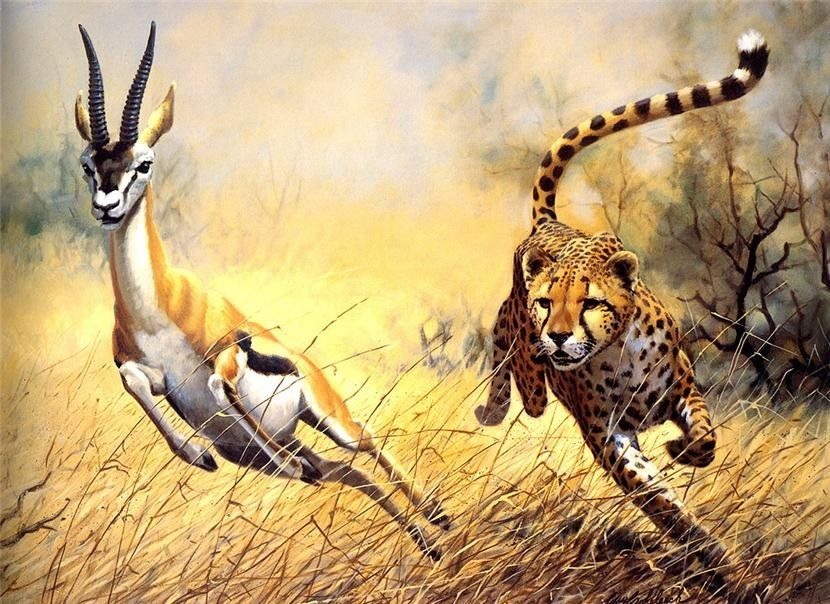
Sheep cannot live without anyone to collect them. They are entirely dependent on a shepherd for everything and without one they will go off in different directions. The same thing will happen to people who are immigrants in different countries. They will seek to return and to flee back to their own country.
[Verse 15] Attempts to flee at that point will be fraught with peril. Anyone found plotting to flee will be killed, and anyone caught in the very act will be killed. This is why leaving the United States of America while there is still time is urgent.
[Verse 16] The destruction of the United States of America and the world will be marked by the atrocities spoken of here, human nature being what it is. People will turn on each other and commit the most heinous of acts. Babies will be snatched up and smashed to pieces on the ground, houses will be pillaged, women will be raped. All of this is to be expected from the sordid character of sinful man whenever there is a weakness he can exploit, and this will be especially so when sinful man thinks the world is coming to an end. All hell will break loose. All sense of morality and decency will go out the window.
None of the aforementioned atrocities happened when Cyrus of Persia captured ancient Babylon in 539 BCE. According to the Babylonian records he took possession of the city peacefully. In fact, Cyrus of Persia went down in history as one of the most benevolent and endearing conquerors the world has ever seen. This is yet another reason we can know the prophet Yashai-Ya’oh was not talking about the capture of ancient Babal in this chapter. He is talking about the destruction of modern-day Babal and of the whole world. The destruction of the United States of America and of the whole world, and the atrocities that will attend both, will happen after the Exodus to the second wilderness is finished and when the ravenous bird whose nickname is Chorash is waving the matah mosadah to the sound of drums and stringed instruments (Yashai-Ya’oh 30:32).
[Verse 17] The Maday in this verse have nothing to do with ancient Medes (refer back to the commentary under verse 4). The remnants of Ya’oh-shar-al in the second wilderness are the Maday (“my measure”) who come against modern-day Babal from a distance. They will not be interested in the silver and gold of Babal because they will have more than enough of silver and gold from YA’OH, the creator and owner of all silver and of all gold (Khag-Ya’oh 2:8).
On the other hand, it is to be noted that the ancient Medes and Persians were very much interested in gold during their conquests. Among ancient rulers, few were as rich as Croesus of Lydia, in Asia Minor near the Aegean Sea. His realm contained huge deposits of electrum, an alloy of gold and silver. Cyrus’ triumph over Lydia filled his treasury with that country’s tremendous wealth in gold. Again, this is yet another clue that the prophet Yashai-Ya’oh was not talking about the ancient Medes and Persians in this chapter.
[Verse 18] The kashathoth nairaym (bows of the young men) are the bows of the Maday, i.e. the weapons of the young remnant nation in the second wilderness. Their weapons are not literal bows shooting literal arrows, but rather weather and natural phenomena shooting off one deadly meteorological disaster after another during a time, times, and a half.
The word kashath (bow) is an allusion to weather because the heavens, where weather occurs, appear to arch over our heads like a bow, and also because the colorful bow in the clouds is a sign of the covenant that YA’OH would never again destroy the world by a flood, a weather related catastrophe. He will, however, destroy the world by other types of weather and violent natural disasters. The bows of the young remnant nation will show no pity whatsoever. They will dash to pieces all peoples indiscriminately, even pregnant women and children. Their eye will not spare them because it is the day of the vengeance of our Alah’aym (Yashai-Ya’oh 61:2) that follows the year of His acceptance, i.e. the Exodus year in the Year 7252.
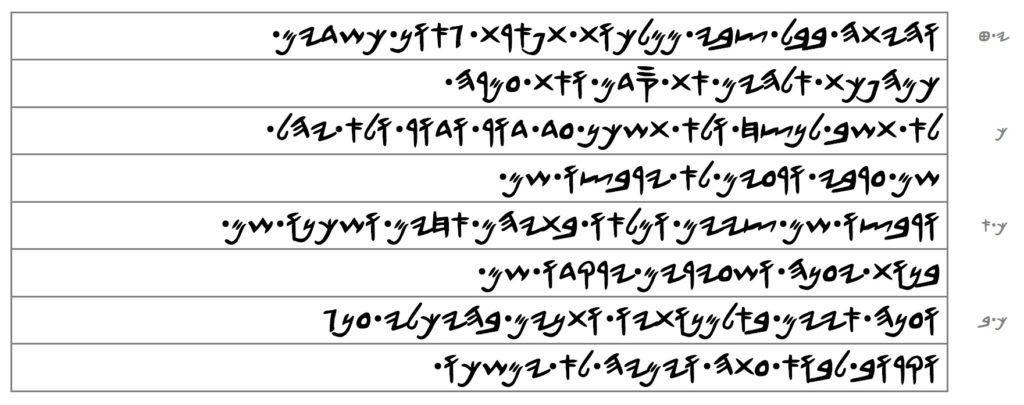
[19] wA-haythah Babal tsabay mamalchoth thap’arath ga’on cha-shadaym cha-mahpachath Alah’aym ath Sadam wa-ath Ghamarah
and it will be, Babal, the glory of kingdoms, the beauty of excellency of the Chashdaym, like the overthrow of Alah’aym: Sadam and Ghamarah
[20] la thAshab la-natsakh wa-la thAshachan ghad dor wa-dor wa-la yahl sham gharabay wa-rai’aym la yarabatso sham
not will it be inhabited to for ever; and not will it dwelt in anymore generation to generation; and not will he pitch there, the Gharabay; and the shepherds, not will they lie down there
[21] wA-rabatso sham tsay’aym wA-mal’a’o bathay-ham akhaym wA-shachano sham banoth yainah wa-shai’ayraym yarakdo sham
and they will recline there the jackals; and they will fill the houses of them, the brothers; and they will dwell there, the true owls; and the shaggy haired goats will dance there
[22] wA-ghanah ay’aym ba-alamanothay’o wa-thanaym ba-haychalay ghanag wa-karob la-bo’ ghath-ha wa-yamay-ha la yamashacho
and it will answer, the hyenas, by the widows of it; and the aquatic reptile in the palaces of pleasure; and near to come is the time of her; and the days of her, not will they be drawn out.
COMMENTARY OF YASHAI-YA’OH 13:19-22
[Verse 19] The ancient city of Babylon located in modern Iraq was never overthrown. The city merely decayed and became dilapidated over time through neglect until it was finally abandoned during the Muslim conquest in the 7th century CE.


As I mentioned earlier, the Medes-Persians did not destroy the city. They simply became the new kings of Babylon in 539 BCE. The city continued to exist during the entire period of the Persian Empire. The Persian kings Dary’osh Hystaspes and his son Xerxes I both put down rebellions at Babylon, but they did not destroy the city. Contemporary dated economic and astronomical cuneiform tablets prove this. The Greeks who succeeded the Persians as rulers of Babylon in 331 BCE did not destroy it either. It is true the Greeks built their new city of Seleucia and that made Babylon less important, but the city of Babylon was never destroyed and turned into a desolate ruin by the Greeks. It was where the Greeks went to become educated and to learn about religion, math, science, and astronomy.
The Parthians did not destroy the city of Babylon either. They invaded in 150 BCE and took it away from the Greeks and ruled it. The Sassanids did not destroy the city of Babylon. They invaded in 224 CE and took it away from the Parthians and ruled it. The city was inhabited all the way up until the Muslim conquest in the mid-7th century (651 CE). That is what finally brought the city of Babylon to an end. From the time of the Muslim conquest the city became ruins and a source of bricks used to build cities from Baghdad to Basra. It has never been inhabited by man ever since, but it was also never overthrown like the overthrow of Sadam (Sodom) and Ghamarah (Gomorrah).
Thus, the city of Babal mentioned in verse 19 cannot be the ancient city of Babylon. It can only be a coded reference to the most powerful city ever to exist on earth, and that city is none other than Washington, D.C., the capital of the United States of America. That is the city that will experience the same destructive overthrow as Sadam and Ghamarah.
[Verse 20] Once destroyed, Washington, D.C. will never again be inhabited. Neither will the Gharabay (the bedouin Arab), who is accustomed to living in the difficult arid steppe, pitch his tent there. Shepherds wont lie down there either since their sheep wont be able to find any thing to graze on there.
[Verse 21] Despite the clues left by the prophet Yashai-Ya’oh in this and the following verse, heathen bible scholars maintain that he was talking about literal animals of the wild, and supernatural demonic creatures, making the ruins of ancient Babylon their home. This of course is nonsense. We will meet these same animals again in Yashai-Ya’oh chapter 34. In that chapter the animals are symbolic of the tribes of Ya’oh-shar-al who will destroy Adom (Edom), and who will claim the land of Adom as a conquered territorial possession by right of war, not as a habitation in which to live.
The tsay’aym (jackals) represents the tribe of Ya’ohdah. This the leading tribe of the nation. The houses will be filled with akhaym (brothers), i.e. other tribes. The heathens think the word akhaym in this verse is an unknown howling animal. The word just means “brothers” in the plural absolute. The banoth yainah (true owl) is the tribe of Ra’oban. The shai’ayr (shaggy haired goat) is the tribe of Shamai’on dancing their victory dance.
[Verse 22] The ay’aym (hyenas) are the tribe of Ban-yamayn. The phrase wA-ghanah ay’aym ba-alamanothay’o (and it will answer, the hyenas, by the widows of it) is a direct allusion to the civil war that almost wiped out every man from the tribe of Ban-yamayn in the period of the judges, leaving the tribe with many widows (Judges 20:35-21:25). The thanaym (aquatic reptile, crocodile) is the tribe of Aparaym. There will be no grandiose buildings or structures still standing when the city Babal is destroyed. The White House will be burned to the ground and become like an empty parking lot. Thus, the haychalay ghanag (palaces of pleasure) occupied by thanaym are symbolic of the former royal palaces of the old northern kingdom which was established by a man from the tribe of Aparaym (1 Kings 11:28-40).
Five tribes are accounted for, and thus the akhaym (brothers) in verse 21 are seven tribes: Ashar, Napathalay, Manashah, Yashshachar, Zabalon, Gad, and Dan. The tribe of Lo’ay is set apart and not numbered with the twelve. As in Yashai-Ya’oh chapter 34, the animals of the wilderness in Yashai-Ya’oh chapter 13 are symbolic of the tribes of Ya’oh-shar-al who will destroy Babal from a distance in the second wilderness, and who will claim the former capital of the United States as a conquered territorial possession by right of war, not as a habitation in which to live. Our twin brother the Adomay (Edomite) in western Africa was the seller of our people during the trans-atlantic slave trade, and the Europeans who founded modern-day Babal were the buyers. Both the seller and the buyer will be utterly destroyed in the day of YA’OH.
wa-karob la-bo’ ghath-ha wa-yamay-ha la yamashacho (and near to come is the time of her; and the days of her, not will they be drawn out). The nearness of time for the destruction of the modern-day city of Babal is to be measured from the point when the nas is put on top of the windswept mountain (verse 2), which is happening in the current Year 7252, the Exodus year. Time is quickly running out.
His name is YA’OH
Always has been. Always will be.
#EXODUS2023
1.15.7252 (April 5, 2023)
